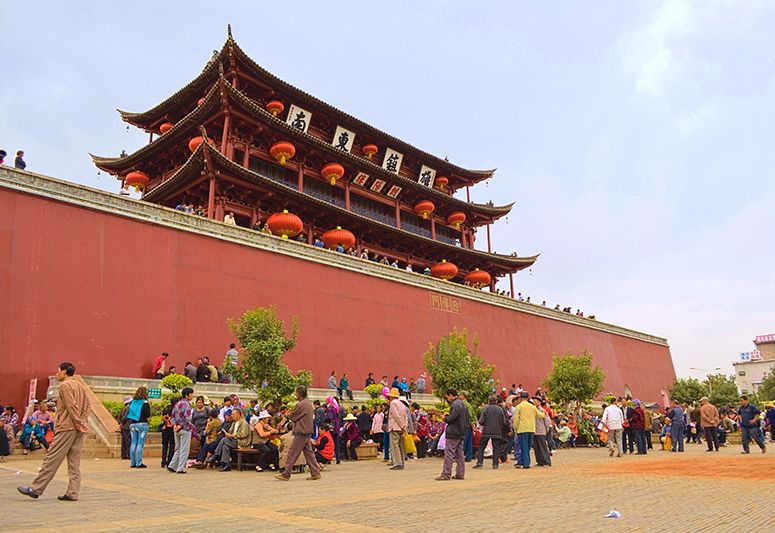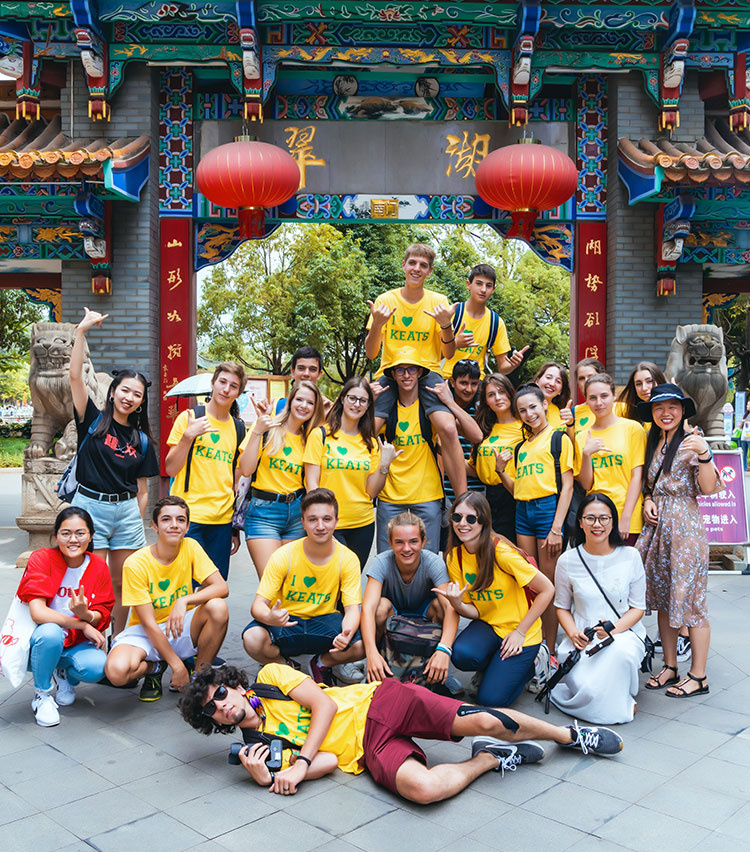Chinese Language Courses in Lijiang
- Intensive One-on-One Chinese Classes
- HSK Test Preparation Course
- Chinese Language Course + Tour in China
- Study Tour in China (for groups)
- Learn Chinese Online

Intensive One-on-One Chinese Classes
- Personal study plans
- Best teachers and private lessons
- Start anytime
- Full immersion experience
- Full services (study + single room accommodation)

HSK Test Preparation Course
- Start anytime
- HSK experts with years of experience
- Get test scores improved significantly
- Intensive one-on-one Chinese class
- Full services (study + single room accommodation)

Chinese Language Course + Tour in China
- Private one-on-one Chinese lessons
- Full services (study + accommodation)
- Excursions and tours with your teacher
- Travel to Dali, Lijiang, Shangri-la, Jianshui, Yuanyang

Study Tour in China (for groups)
- Designed for high schools, universities, companies, and organizations
- Chinese course with group activities
- Professional Chinese teachers
- A true Chinese immersion experience

Learn Chinese Online
- Live 1-on-1 online Chinese lessons
- Learn Chinese online anytime
- Study Mandarin anywhere
- Professional Chinese teachers
- Personal study plans
Intensive One-on-one Chinese Course
Intensive One-on-one Chinese Course
You can choose to study Chinese in Lijiang for 4 hours per day (20 hours/week) or 6 hours per day (30 hours/week). If you want to learn Mandarin Chinese in China, the intensive one-on-one Chinese course is the fastest way to improve your Chinese.
We use unique teaching methods developed by Keats. Your Chinese teacher(s) will prepare your lessons according to your level of Chinese and your learning goals to ensure that you learn the most Chinese in the shortest possible time.
Accommodation is included.
Accommodation in Lijiang
Accommodation in Lijiang
- Single/Double room accommodation with private bathroom
- Clean, safe and comfortable
- Located in the Shuhe Ancient Town
- Room cleaning service every day
Why learn Chinese in Lijiang?
Why learn Chinese in Lijiang?
Lijiang is an essential part of the Yunnan-Tibet Ancient Tea-Horse Road and the Ancient southern Silk Road. By having a Chinese immersion class here, you can enjoy both studying and sightseeing simultaneously. It is located at the junction of the Yunnan-Guizhou Plateau and the Qinghai-Tibet Plateau. Lijiang is the best place to appreciate the snow scenery of the prominent peak of the Yulong Snow-capped Mountain.
Lijiang is also a touring destination to enjoy the delights of both cultural and historical sites. Lots of ethnic minority groups in Lijiang form diverse customs and traditions here.
Lijiang is also the home of many world heritages: the World Cultural Heritage – Lijiang Ancient City, the World Natural Heritage-Three Parallel Rivers, and the World Memory Heritage – Naxi Dongba Ancient Literatures.
Full Immersion in Chinese
Full Immersion in Chinese
- If you prefer to have an all-Chinese learning environment and not speak any English, Lijiang is for you. Please don’t be surprised if you are the only student in Lijiang or if you barely see any international visitors.
- The best thing about studying in Lijiang is that your teacher will accompany you to do sightseeing every day after class, to create a pure Chinese language environment for you. Studying Chinese in Lijiang not only focuses on the Chinese language but also offers a chance to explore the local culture with your teacher.
- If you prefer a big and vivid international student community or expect a school community experience, please choose to learn Chinese in Kunming at the Kunming campus.
Beautiful Scenery in Lijiang
Immerse yourself in Lijiang's enchanting blend of ancient culture, breathtaking natural beauty, and vibrant nightlife, a timeless haven where the traditional Naxi lifestyle meets the majestic Jade Dragon Snow Mountain.
How to Get to Lijiang?
How to Get to Lijiang?
Different types of transportation in China can be chosen when traveling to Lijiang to learn Chinese.
Lijiang city is located in north-western Yunnan, approximately 310 miles northwest of the provincial capital of Kunming.
There is Sanyi International Airport, a High-speed Train Station, and a Coach Station in Lijiang to choose a different type of transportation.
The most convenient way of getting to Lijiang is to fly to Kunming first and then take the high-speed train to Lijiang. It takes about 3 hours and is about RMB 220.
We offer airport/train station pick-up and drop-off services for free.
Places to Visit in Lijiang – Yulong Snow-capped Mountain
Places to Visit in Lijiang – Yulong Snow-capped Mountain
Yulong Snow-capped Mountain has the most beautiful snowy scenery, with 13 peaks undulating under the clear blue sky. Looking from a distance, the Yulong snow-capped mountain is like a silvery dragon wandering in the air.
Yulong Snow-capped Mountain is located about 15 kilometers north of Lijiang City. It covers an area of 960 square kilometers, and the scenic area is 263 square kilometers.
Places to Visit in Lijiang – Lijiang Ancient City
Places to Visit in Lijiang – Lijiang Ancient City
Where can you enjoy both tranquillities of life and take private Mandarin lessons in China simultaneously? Go to Lijiang Ancient City.
The Ancient Town of Lijiang is also known as the Dayan Ancient Town. It is a national historical and cultural city built in the late Song and early Yuan Dynasty (late 13th century AD). It is located in the middle of Lijiang city. It is also the most well-preserved ancient town in China with the most Naxi style. It has an altitude of 2,416 meters and covers an area of 3.8 square kilometers. In December 1997, it was included in the “World Cultural Heritage” list by the UNESCO World Heritage Committee.
Places to Visit in Lijiang – Tiger Leaping Gorge
Places to Visit in Lijiang – Tiger Leaping Gorge
Tiger Leaping Gorge is about 56 miles away from Lijiang City.
After the swift Jinsha River flows through the First Bay of the Yangtze River in Shigu Town, it suddenly turns north. It squeezes through the gap between the Haba Snow-capped Mountain and the Yulong-capped Snow Mountain, forming the world’s most spectacular grand canyon. The narrowest place of the canyon is the famous Tiger Leaping Gorge landscape. The entire Tiger Leaping Canyon is 20 kilometers long and is divided into three sections: Upper Tiger Leaping Gorge, Middle Tiger Leaping Gorge, and Lower Tiger Leaping Gorge. Among them, the Middle Tiger Leaping Gorge section is a paradise for backpackers. Hiking in the Middle Tiger Leaping Gorge is an experience you cannot miss in Lijiang.
Places to Visit in Lijiang – Lugu Lake
Places to Visit in Lijiang – Lugu Lake
If you’re interested in ethnic minority groups’ culture and customs, you may want to visit Lugu Lake after taking your intensive Chinese language program.
In the Mosuo language of the Naxi people, “lu” means mountain valley, and “gu” means “inside.” Therefore, the name Lugu Lake means the lake embodied in the valley. The Lugu Lake is also regarded as the “Mother Lake” by the local Mosuo people. The Mosuo family in Lugu Lake still retains the matrilineal family tradition of female heads and female members. And the matrilineal clan marriage system (commonly known as walking marriage) of “Men do not marry. Women do not marry, union voluntarily, and separation and freedom.” Those who like the beautiful scenery of the lake should not miss it.
Places to Visit in Lijiang – Blue Moon Valley
Places to Visit in Lijiang – Blue Moon Valley
Blue Moon Valley is known as the “White Water River” earlier.
On a sunny day, the color of the water is blue, and the valley is crescent-shaped. Looking from a distance, it looks like a blue moon inlaid at the foot of Yulong Snow-capped Mountain, which is called Blue Moon Valley.
The name “White Water River” is due to the white mud at the bottom of the river, which will turn the river white when it rains, so it is also called “White Water River.”
Things To Do in Lijiang – Hike in Anaguo
Things To Do in Lijiang – Hike in Anaguo
You can have a hiking workout when learning Chinese in Lijiang, China.
Anaguo is located in Taohua Village in Lijiang City. It is also known as Anago and Anage. It is a new entry-level hiking mecca in China. Touring attractions like virgin forests, alpine pastures, sunrise in clouds, azalea forests, spruce forests, yew forests, rocky mountains, Iris Valley, and Xiangshui River in Anaguo.
Over 7300 Students Have Studied at Keats
Students' TestimonialsThings To Do in Lijiang – Horse riding and boating at Lashihai Lake
Things To Do in Lijiang – Horse riding and boating at Lashihai Lake
Lashihai Lake is about 15 kilometers away from the ancient city of Lijiang. This wetland park mainly includes four areas: Lashi Lake, Wenhai Lake, Jizi Reservoir, and Wenbi Reservoir. Here you can ride a horse on the ancient Tea-horse road, boat in the lake and watch birds. Traveling through the virgin forest, you can also appreciate the pretty views of the Qixian Lake and Mei River.
Every winter, about 30,000 birds will migrate to this wetland area to spend the wintertime, including 57 rare and endangered birds such as Panhead geese, black-necked cranes, and white swallows.
Cuisine in Lijiang – Cured Spareribs 腊排骨
Cuisine in Lijiang – Cured Spareribs 腊排骨
The most common way of having the Lijiang cured spareribs is the hotpot.
Lijiang Cured Spareribs Hot Pot is a traditional delicacy of the Naxi people. The soup is boiled with cured pork ribs. In addition, various side dishes are cooked simultaneously, which also contributes to the delicious taste of the dish. Lijiang Cured Spareribs effectively fuse the pork meat and bone flavors so that the flavor elements can easily be dispersed into the soup. Therefore, no matter what you put into the hot pot, it can well absorb the Cured Spareribs’ rich fragrance and rich taste.
Cuisine in Lijiang – Chicken Pea Flour Jelly 鸡豆凉粉
Cuisine in Lijiang – Chicken Pea Flour Jelly 鸡豆凉粉
Chicken Pea Flour Jelly is a signature food in the Lijiang Ancient Town. The raw chicken pea is a legume unique to Lijiang, which is oblate in shape and the size of chicken eyes. Because the chicken pea is rich in melanin, the appearance of chicken pea flour jelly looks grey and black, so people also call it “black jelly.”
Chicken Pea Flour Jelly can be cooked as both a cold dish and a hot dish. The cold dish is more common to see in summer. Cutting the jelly into slices first, and then dressing colorful condiments to make it tasty. In winter, it’s typically cooked as a hot dish. People fry the jelly slices in a pan until it turns golden brown on both sides and then serve them with different sauces, which is also delicious.
Besides the chicken pea flour jelly, there are another 10 dishes you must try when learning Chinese in Yunnan.
FEES
1/5
CHOOSE A PROGRAM
- Intensive One-on-One Chinese Classes
- HSK Test Preparation Course
- Chinese Language Course + Tour in China
- Study Tour in China (for groups)
- Learn Chinese Online
FAQ
HOW TO GET TO LIJIANG?
Lijiang city is located in north-western Yunnan, approximately 310 miles northwest of the provincial capital of Kunming.
There is Sanyi International Airport, a High-speed Train Station, and a Coach Station in Lijiang to choose a different type of transportation.
The most convenient way of getting to Lijiang is to fly to Kunming first and then take the high-speed train to Lijiang. It takes about 3 hours and is about RMB 220.
We offer airport/train station pick-up and drop-off services for free.
What's the year around temperature in Lijiang?
Lijiang, located in China’s Yunnan province, is known for its relatively mild climate due to its high altitude. The average temperatures throughout the year are as follows:
- Winter (December – February): The average low temperature is around 2-4°C (36-39°F), and the average high temperature is around 15-16°C (59-61°F).
- Spring (March – May): The average low temperature is around 8-13°C (46-55°F), and the average high temperature is around 20-23°C (68-73°F).
- Summer (June – August): The average low temperature is around 16-18°C (61-64°F), and the average high temperature is around 23-26°C (73-79°F).
- Autumn (September – November): The average low temperature is around 7-13°C (45-55°F), and the average high temperature is around 19-23°C (66-73°F).
What does the tuition fee include?
The tuition fee includes:
- 4/6 hours of one-on-one Chinese lessons per day Monday to Friday
- Accommodation (A clean and safe single/double room with private bathroom)
- Program Certificate
We also offer a list of free services for studying in Lijiang:
- Airport/train station pick-up and drop-off
- Internet access use without limit
- Saturday excursions
- Laundry
- A tour of the surroundings (bank, supermarket, post office etc.)
- Medicine for minor illnesses
- Advisors available to offer help
- 24/7 support
- Access to The Chairman’s Bao online learning platform
- Visa application assistance
- Room cleaning every day
Where to eat in Lijiang?
The Keats Lijiang campus is conveniently located in the Shuhe Ancient Town, where there are many food choices.
Shuhe Ancient Town, located in Lijiang, is a UNESCO World Heritage Site known for its well-preserved ancient architecture and charming streets. It’s also a great place to try some local Yunnan and Naxi cuisine. Here are some local dishes and snacks you should try:
- Naxi Grilled Fish (Naxi Kao Yu): This is a must-try dish in Shuhe. The fish is marinated with local herbs and spices, then grilled over charcoal. It’s often eaten with a spicy dipping sauce.
- Paba: A traditional Naxi staple food made of highland barley, wheat, peas, or broad beans. It’s often eaten with yak butter tea.
- Sour and Spicy Fish Hot Pot (Suan La Yu): A popular dish in Yunnan, this hot pot features fish cooked in a broth with pickled vegetables and lots of chili and Sichuan peppercorns.
- Yak Meat: Yak meat is a specialty in this region. You can find it in various forms – grilled, in hot pots, or even dried and served as a snack.
- Er Kuai: A type of rice cake that’s very popular in Yunnan. It can be served sweet or savory – grilled with a sweet brown sauce, or stir-fried with vegetables and meat.
- Rose Petal Jam: Made from the roses that grow abundantly in Yunnan, this jam is sweet and fragrant. It’s often served with bread or baba.
- Yunnan Coffee: Yunnan is one of the coffee-producing regions in China. Don’t miss the chance to try locally grown coffee in one of the cafes in Shuhe.







